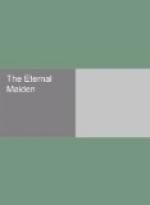Annadoah awoke. At first she gazed about dazedly. Then she realized that the ilisitok had been with her—she observed the meat and warm water by her couch. She realized also that the wise woman must have seen the horror which had gripped her heart like the teeth of wolves. Beneath lids scarred as by the claws of a hawk, the baby’s eyes had been blasted by some unknown prenatal disease—the terrible dead, with their talon-hands, had smitten! The child was organically blind, and, being defective and fatherless, Annadoah knew that, by the law of her people, it was doomed to immediate death. While she shook with terror, withal a grim determination rose within her. All the tremendous urge of that mighty mother-love which has beautified and ennobled the world clamored in the heart of this simple woman that her child must not die.
As she touched the infant with a sacred tenderness, her very hands warmed with the impassioned affection that throbbed through her with every heart-beat. As she gazed upon the features, faintly suggestive of its father’s, she felt that she could never part from this familiar and intimate link with the spontaneous and powerful passion of her girlhood. When she peered into those piteous, blighted eyes, mighty sobs of pity shook her, but she felt that she must be silent, and she forced back the tears. Outside, a spring bunting was still singing, sweetly, ineffably.
As she caressed it, the child’s face twisted as if in pain.
“Well do I know, little one, thou dost desire thy name—ategarumadlune,” she said. “Thou dost desire it as that which is as precious as thy shadow. But the ilisitok has gone and never will she breathe o’er thee the name I know . . . the name I felt stirring within me since the night . . . when the women addressed the dead . . . Sweetly didst thou sing within my heart—but thy song came from the darkness. Yea . . . from the darkness. Ioh-iooh!”
Very gently, very softly, she pressed her fingers upon the baby’s sightless eyes.
“I shall call thee little Blind Spring Bunting,” she softly murmured, lifting the baby and pressing its tender face to her own. “Poor Little Blind Spring Bunting.” She soothed its face, infinite pity in her eyes. “Thou wilt never see Sukh-eh-nukh, nor the ahmingmah, nor the birds that fly in the air, Spring Bunting. All thy days shall be as the long night, and thy whole life shall be without any light of moon. But thy heart is warm and bright as the sun in the south, whence Olafaksoah came, and it makes the heart of Annadoah very warm. Poor . . . Little . . . Blind Spring Bunting!”
Murmuring softly she rocked the little baby gently in her arms. Then she heard the ominous sound of a native rushing by the igloo and voices upraised. What were they saying? That Annadoah’s child was blind?
A frantic determination to escape filled her. The danger was immediate—she must act at once. But what should she do? Where should she go?




